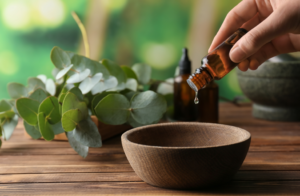
Sleep apnea affects an estimated 39 million US adults, making it quite a common condition! But despite its rampancy, it’s not harmless by any means—if left untreated, lost sleep is far from the only consequence you’ll face, as it also has some pretty serious health implications. Fortunately, sleep apnea can be treated with the help of a skilled sleep dentist—but outside of that, many patients wonder if things like essential oils can provide symptom relief. Continue reading below to learn more about sleep apnea and some oils that might prove useful for getting sleep.
What Is Sleep Apnea?
Sleep apnea is a condition that causes affected patients to wake up continuously throughout the nighttime due to inadequate airflow. It’s often due to the collapse of soft tissues inside the airway; since the body is unable to get enough oxygen, it’s forced to wake up to normalize breathing patterns. This essentially kicks the brain out of its deep sleep phase, known as REM, which means that the body isn’t able to experience the restorative benefits of sleep.
These episodes can occur hundreds of times in a given night, leading to a massively compounded loss of sleep. But daytime fatigue and sleepiness are not the only symptoms that can result from this: high blood pressure, an increased risk of stroke, diabetes, and even cardiovascular disease are all very real possibilities.
What Essential Oils Can Help with Sleep Apnea?
Recently, many essential oils have emerged as possible solutions for managing sleep apnea symptoms. It’s worth noting that these oils cannot resolve symptoms as effectively as professional treatment, such as the use of a CPAP machine or oral appliance. Nonetheless, a few at-home remedies that may help include:
Peppermint Oil
It’s been proven that peppermint oil can improve the way your brain functions and improve your overall mood. It can also clear the sinuses and make breathing easier. These benefits directly translate to more restful sleep.
Lavender Oil
Studies have shown that those who use lavender oil before bed report more restful sleep and fewer disturbances. It comes in several forms, with diffused oil being a popular option.
Lemon Oil
The fresh citrus scent of lemon oil can open the sinuses, improve one’s mood, and instill a sense of well-being—or cleanliness, given how the scent is used in most cleaning products. Nonetheless, it can also reduce feelings of anxiety, making it an excellent option for treating insomnia and sleep apnea.
Clove Oil
Clove has a variety of medicinal uses, with one of the main ones being its usefulness in loosening mucus in the chest, throat, and sinuses. This can directly help with sleep apnea symptoms relating to asthma, bronchitis, or other respiratory conditions.
Eucalyptus Oil
Research shows that eucalyptus can help break up the mucus in your respiratory system, including your sinuses and even the back of your throat. People have been using this oil to relieve respiratory symptoms for quite some time. Plus, it has a pleasant and fresh aroma!
About the Practice
The team at Star Sleep & Wellness in Denton has proudly served patients and families in the area for several years, offering a wide range of services aimed at treating sleep disorders and restoring high-quality rest each night. If you have any questions about the article or you’d like to schedule a visit for you or a loved one, feel free to contact the practice online or over the phone for additional information or assistance. Telephone: (469) 772-6721.
